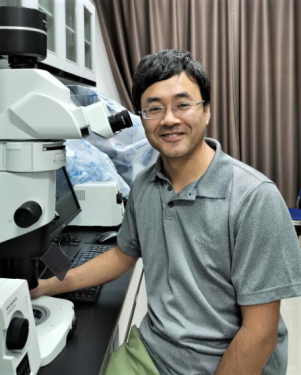个人简历

一、基本信息
祁斌,bat365官网登录入口生命科学学院/中心研究员。实验室以秀丽隐杆线虫(C. elegns)为模式生物,解析肠道微生物调控动物食物消化、肠道菌群维持平衡的机理。其研究成果发表在Cell Host & Microbe、eLife、Cell Reports、Nature Communications、Cell等主流期刊。主持国家海外高层次人才青年项目、国家重点研发计划“发育编程及其代谢调节”重点专项(青年项目)、国家自然基金面上项目、云南省“杰出青年”项目等。Email:qb@ynu.edu.cn
二、教育经历
2008.9-2013.11 中科院上海植物生理生态研究所, 博士,导师:郑慧琼
2004.9-2008.6 吉林大学植物科学学院, 本科;
三、工作经历
2019.10-至今 bat365官网登录入口生命科学中心,研究员,博导
2015.5-2019.5 University of Colorado Boulder/HHMI,博士后,导师:Min Han
2013.11-2015.4 University of Texas Austin,博士后,导师:Hong Qiao
四、研究方向
以秀丽线虫为模式生物,来解析宿主-细菌互作,重点感兴趣:
1. 食物消化方向:肠道微生物如何调控动物食物消化系统?动物如何感应-评估-消化食物?
2. 细菌-宿主互作方向:动物如何调控肠道菌平衡?病原菌与宿主如何共存?
五、发表论文 (共同第一作者# 共同通讯作者*)
Google Scholar: https://scholar.google.com/citations?hl=en&user=mmGdRJwAAAAJ
1. Sucheng Zhu#, Xinyi Zhou#, Bin Qi. (2024). Host-pathogen Coadaptation by running with PAR protein. bioRxiv, doi: https://doi.org/10.1101/2024.01.31.578330
2. Liu, P., Liu,X., and Qi, B. (2024). UPRER–immunity axis acts as physiological food evaluation system that promotes aversion behavior in sensing low-quality food. eLife, https://doi.org/10.7554/eLife.94181.1
3. Chen Y#, Yang R#, Qi B*, Shan Z*. (2024). Peptidoglycan-Chi3l1 interaction shapes gut microbiota in intestinal mucus layer. eLife,
https://doi.org/10.7554/eLife.92994.1
4. Xuepiao Pu, Bin Qi. (2024). Lysosomal dysfunction by inactivation of V-ATPase drives innate immune response in C. elegans. Cell Reports,
https://doi.org/10.1016/j.celrep.2024.114138
5. Fanrui Hao#, Huimin Liu,# Bin Qi. (2024). Bacterial peptidoglycan acts as a digestive signal mediating host adaptation to diverse food resources in C. elegans. Nature Communications,
https://www.nature.com/articles/s41467-024-47530-y
6. He, Y#., Hao, F#., Fu, H., Tian, G., Zhang, Y., Fu, K., and Qi, B. (2023). N-glycosylated intestinal protein BCF-1 shapes microbial colonization by binding bacteria via its fimbrial protein. Cell Reports 42, 111993. https://doi.org/10.1016/j.celrep.2023.111993
7. Huimin Liu and Bin Qi. (2023) Protocol for investigating the effect of food digestion in C. elegans on development by feeding the inedible bacteria Staphylococcus saprophyticus.
Star Protocols. https://doi.org/10.1016/j.xpro.2022.101990
8. Geng, S#., Li, Q#., Zhou, X#., Zheng, J#., Liu, H#., Zeng, J., Yang, R., Fu, H., Hao, F., Feng, Q., and Qi, B. (2022). Gut commensal E. coli outer membrane proteins activate the host food digestive system through neural-immune communication. Cell Host & Microbe.
https://doi.org/10.1016/j.chom.2022.08.004
Previewed by Kaveh Ashrafi, Better living through communal eating. Cell Host & Microbe
. 2022 Oct 12;30(10):1343-1344. https://doi.org/10.1016/j.chom.2022.09.005
Reviewed by Grant Otto, Gut commensals activate digestion. Nature Reviews Microbiology 20, 637 (2022). https://doi.org/10.1038/s41579-022-00799-6
2019年之前(博后、研究生阶段论文):
9. Sewell, A.K., Han, M., and Qi, B. (2018). An unexpected benefit from E. coli: how enterobactin benefits host health. Microbial cell 5, 469-471.(Cover)
10. Qi, B., and Han, M. (2018). Microbial Siderophore Enterobactin Promotes Mitochondrial Iron Uptake and Development of the Host via Interaction with ATP Synthase. Cell 175, 571-582.e511. https://doi.org/10.1016/j.cell.2018.07.032
(Accompanied by a Preview by Dennis H. Kim, Bacterial Siderophores Promote Animal Host Iron Acquisition and Growth. Cell, https://doi.org/10.1016/j.cell.2018.09.020 )
(Reviewed by Gregory J. Anderson, Iron Wars — The Host Strikes Back. The New England Journal of Medicine. 2018, DOI: 10.1056/NEJMcibr1811314 )
11. Qi, B., Kniazeva, M., and Han, M. (2017). A vitamin-B2-sensing mechanism that regulates gut protease activity to impact animal's food behavior and growth. eLife 6.
https://elifesciences.org/articles/26243
12. Zhang, F#., Qi, B#., Wang, L#., Zhao, B., Rode, S., Riggan, N.D., Ecker, J.R., and Qiao, H. (2016). EIN2-dependent regulation of acetylation of histone H3K14 and non-canonical histone H3K23 in ethylene signalling. Nat Commun 7, 13018. (#co-first author)
13. Qi, B., and Zheng, H. (2013). Modulation of root-skewing responses by KNAT1 in Arabidopsis thaliana. The Plant journal 76, 380-392.
欢迎本科生,研究生,加入实验室,共同探索未知的领域。且欢迎广大科研爱好者来实验室交流,学习,访问,合作。实验室长期招聘应届博士毕业生(可申请bat365官网登录入口“人才培优计划”http://www.rsc.ynu.edu.cn/info/1052/4021.htm)、博士后、助理研究员。


